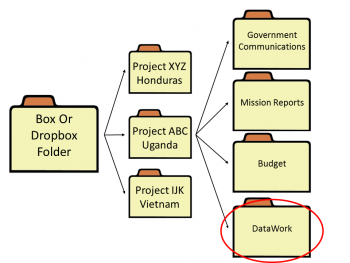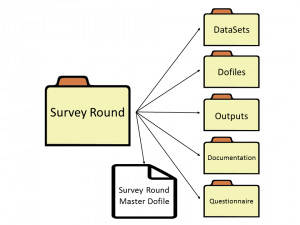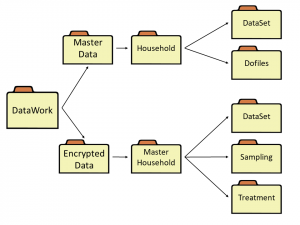Difference between revisions of "DataWork Folder"
Kbjarkefur (talk | contribs) |
Kbjarkefur (talk | contribs) |
||
| Line 33: | Line 33: | ||
=== Multiple Units of Observation === | === Multiple Units of Observation === | ||
If you have multiple [[Unit of Observation|units of observation]] in a survey round for example farmers and villages, or students, teachers and schools, then you should create a survey round folder for each unit of observations. | If you have multiple [[Unit of Observation|units of observation]] in a survey round for example farmers and villages, or students, teachers and schools, then you should create a survey round folder for each unit of observations. For example, you would end up with one survey round folder called baseline_students, one called baseline_teachers and one called baseline_schools. | ||
==AdminData== | ==AdminData== | ||
Revision as of 17:57, 22 March 2017
A well organized data folder reduces the risk for many types of errors. At DIME we have a standardized folder structure. Some projects have special folder requirements and only use the folder set up as a starting point, but many resources created by DIME are easier to take advantage of if this template is followed. It takes a lot of work to reorganize a project folder, so we strongly recommend that projects follow our standard from the beginning. A poorly set up folder will have inefficiency consequences and increase the risk of errors over several years.
We have published a command called iefolder in our package ietoolkit that we have published on SSC. iefolder sets up the recommended folder structure described in this article for you.
Read First
- Do not set up these folders manually. iefolder is a Stata command that easily sets up and updates this folder structure for you
Where should the DataWork folder be created?
Most folders are shared across the project teams using a DropBox, Box or similar. In this folder there are usually a lot of folders for project budget, government communications etc. The DataWork folder is assumed to be one of them.
See the Image 1 to the right with one example of a Box/DropBox folder with three project folders. All three projects has a similar sub-folder structure, but in the image only one of the projects sub-folder structure is show. The DataWork folder is highlighted with a red circle.
Anything related to the data of a project has a designated location inside this folder. This includes data-files, sampling and treatment assignment code, questionnaires, data collection documentation, analysis code, analysis output etc. This includes data collected by hour selves, both regular survey rounds and monitor data, but it should also include other sources of data such as admin data or secondary data.
Inside the DataWork folder
Inside the DataWork folder there should only be folders and files that help navigating those folders. In our standardized folder there are only three types of folders; Survey Rounds (Baseline, Endline etc.), Monitor Data and Master Data Sets. What's described here is only a template structure and additional folders are often needed. But we recommend that you try to fit even additional folders into one of these folder types and create them using iefolder.
In addition to the folders, in our standardized folder structure, there is also a Project_MasterDofile inside the DataWork folder. This file have three purposes. The first two are described in detail in the article for Master Dofiles, but in short they are that it makes it possible to run all code related to one project at the same time, and it also sets up all the folder paths required to run any dofile for this project. The third purpose is that this file is the main map to the DataWork folder. Since all code can be run from this file, and since all outputs are (indeirectly) created by this file, this file is the starting point to find where any do-file, data set or output is located in the DataWork folder. Another examples of files that helps with the navigation of the folder could be a Word document or a PDF describing how to navigate the sub-folders. Such files are not included in our folder template, but may sometimes be a good addition. Although, keep the number of files in this folder to an absolute minimum.
Survey Round
Baselines, Follow Up Surveys, Midlines, Endlines are examples of a Survey Round. This is the data that we in Impact Evaluations will test if it changes over time and if that change is significantly different between treatment and control. In contrast, the information in the master data sets, like the ID assigned by us, weather you were sampled for baseline, weather you are selected for treatment or control are all examples of information that is time invariant and will remain the same over the course of the project. Monitor data might change over time, for example in a impact evaluation running over many years one observation might not take up the treatment the first year but might do so the next year.
Each survey round should have it's own sub-folder inside the DataWork folder. For example - Inside the main data folder, you can have sub-folders like baseline, follow up 1, follow up 2, midline, endline, etc. See image 3 for an example. When you create a survey round folder using the command iefolder all sub-folders and sub-sub-folders described below will be created for you and all your master dofiles will be updated or created accordingly.
Inside each Survey Round folder you will find a master do file for that survey round as well as the following folders DataSets, Dofiles, Outputs, Documentation, and Questionnaire.
Multiple Units of Observation
If you have multiple units of observation in a survey round for example farmers and villages, or students, teachers and schools, then you should create a survey round folder for each unit of observations. For example, you would end up with one survey round folder called baseline_students, one called baseline_teachers and one called baseline_schools.
AdminData
Admin data can both be used as the main data in the analysis or as secondary data that is combined with the main data in the analysis. A folder with admin data should be organized as much as possible as a survey round folder. The reason a small distinction is made is that admin data might not always be primary data collected by the project team. Admin data is often collected, cleaned and/or aggregated by someone other than the team. Therefore some of the recommendations made in the section above does not apply.
If the admin data is collected as main data in multiple rounds, then it might make most sense to treat this data as survey round in the sense that one folder should be made for each round of data collection. But if the amount of work that is required for each round is small, then that is probable not the case.
MonitorData
Monitor data is data collected to understand the implementation of the assigned treatment in the field. Monitor data varies with each project, but can range from data collected on whether seeds were distributed in an agriculture project, to was saving groups formed and who joined them in a financial inclusion project, or to was school books distributed in an education project. In comparison, the main data focuses on outcomes as in a farmers harvest size in the agriculture project, amount of savings in the financial inclusion project and test scores in the education project. Without the information in the monitor data there is no way to know that any any change in the outcome can be attributed to the the project. This is particularly interesting in the absence of change in outcome data.
Monitor data is often collected the same way as surveys, but it could also be collected in the same way as admin data. Depending on which, follow the respective instructions from above. Most important is that monitor data is separate from the survey round data we are collecting. The main data tells us the result, the monitor data tells us about internal validity.
MasterData
Master data sets are data sets that make sure the observations are correctly identifiable across data sets. Master data sets also includes important information such as sampling, treatment assignment etc. This is a very important topic and master data sets has its own article. What is important in the aspect in DataWork folder management is that the master data set should have their own folder as it is a meta-dataset that stores data useful to all other datasets.
Back to Parent
This article is part of the topic Data Management



